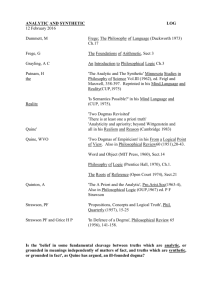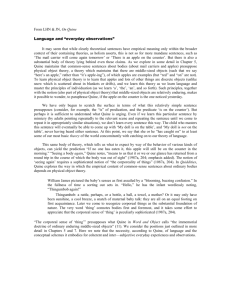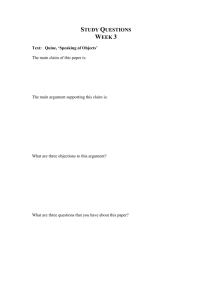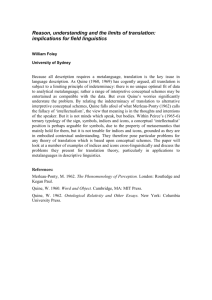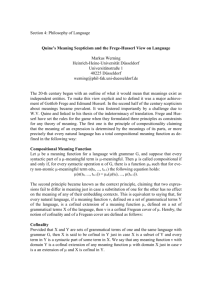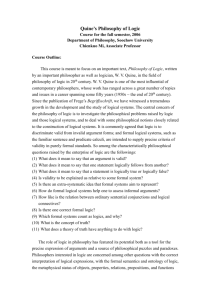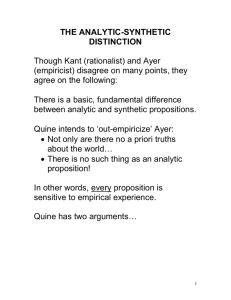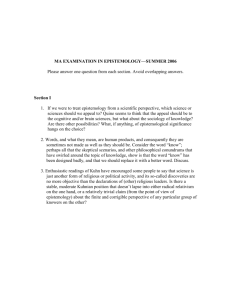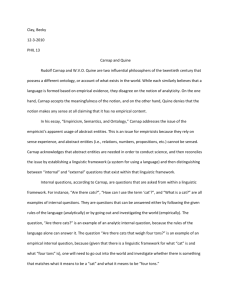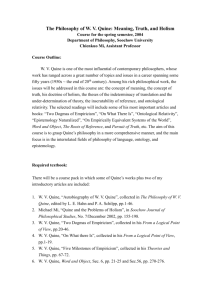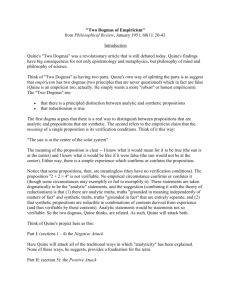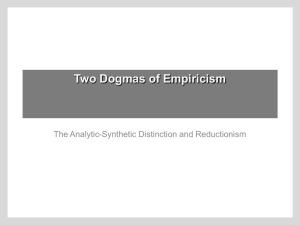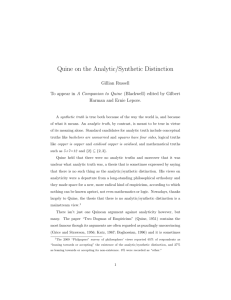PY 4613 Quine: Analyticity and the a priori
advertisement
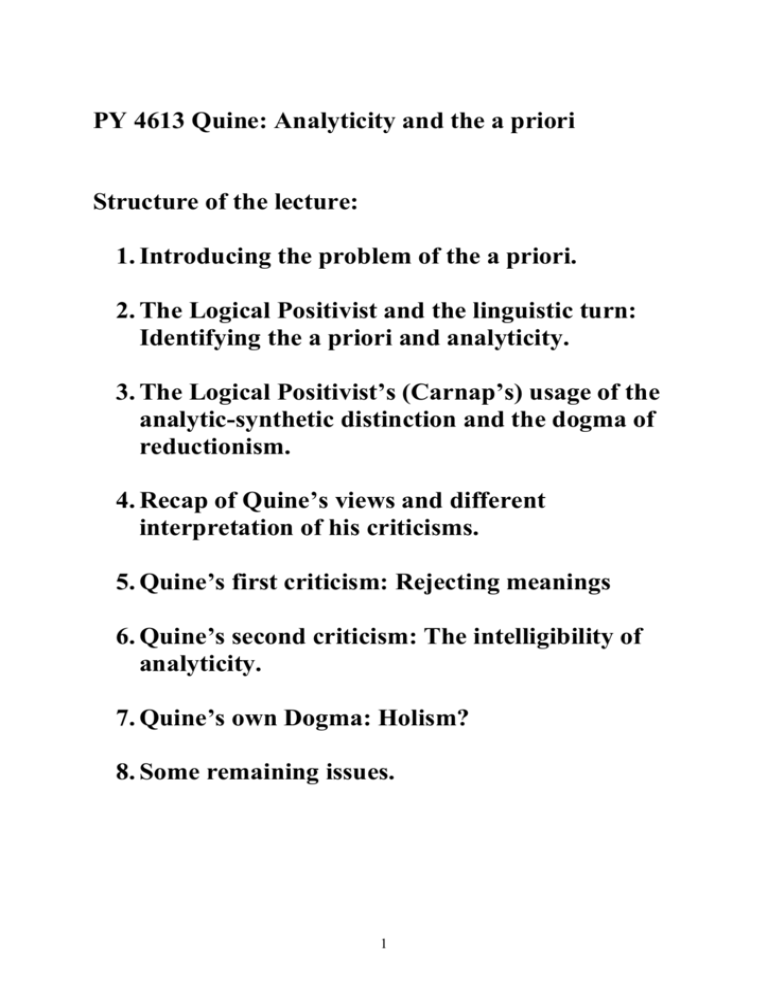
PY 4613 Quine: Analyticity and the a priori Structure of the lecture: 1. Introducing the problem of the a priori. 2. The Logical Positivist and the linguistic turn: Identifying the a priori and analyticity. 3. The Logical Positivist’s (Carnap’s) usage of the analytic-synthetic distinction and the dogma of reductionism. 4. Recap of Quine’s views and different interpretation of his criticisms. 5. Quine’s first criticism: Rejecting meanings 6. Quine’s second criticism: The intelligibility of analyticity. 7. Quine’s own Dogma: Holism? 8. Some remaining issues. 1 1. The problem of the a priori a) Empiricism: All knowledge is empirical, i.e grounded in experience. b) Existence of a priori knowledge: Cases where knowledge is independent of experience, such as Mathematical Statements Logical Truths “All bachelors are unmarried” Different solutions: Mill’s solution: Reject (b) there is no a priori knowledge Render what seems like a priori knowledge as empirical knowledge. Kant’s (Rationalist) solution: There is a body of a priori knowledge, not grounded in experience but rather in pure intuition. 2 These truths are grasped by a non empirical faculty (mode of cognition) This gives rise to the idea of synthetic a priori knowledge. There are also truths that are analytic. They are neither grounded in experience nor in pure intuition. These are linguistic truths, grounded in concepts used. Logical Positivists/Empiricists (Carnap): Impressed by the scientific method: It ensured consensus amongst scientist about the merits of their theories. Scientific results are testable and debates “come to an end” in experiments. In contrast: Metaphysical claims or Ethical debates. (Scheinprobleme) Adopt the scientific method in general. Result: No strange (= unscientific) faculties. Knowledge is either empirical or based on linguistic conventions. 3 2. The Logical Positivist and the linguistic turn: Identifying the a priori and analyticity. Empiricism*: All substantial knowledge is empirical. It can only be known through experiment and observation. A priori knowledge: All non-empirical knowledge is non-substantial and merely based on linguistic conventions. All a priori knowledge is analytic: An empty reflection of the rules governing the meanings of expressions of our language. Logical positivist slogan: A statement is analytic when it is true by virtue of meaning and independently of facts. What is the role of analytic statements for the Logical Positivist? 4 3. The Logical Positivist’s (Carnap’s) usage of the analytic-synthetic distinction and the dogma of reductionism. Plurality of linguistic frameworks, each comprising: System of logical principles A set of so-called meaning postulates fixing the meaning of the terms involved in a linguistic framework. Certain “protocol-sentences”, i.e. basic observational sentences. Example of a meaning-postulate: The introduction of numerals into a linguistic framework. Principle of tolerance: “In logic there are no morals. Everyone is at liberty to build up his own logic, i.e. his own form of language as he wishes.” (Carnap, 1937, p.52) “Let us be cautious in making assertions and critical in examining them, but tolerant in permitting linguistic forms.” (Carnap, 1956, p. 221) Pragmatic considerations decide which linguistic framework to adopt. 5 Carnap’s resolution of philosophical debates: Either they are issues internal to a framework, then they can be resolved either by (dis)-confirmation of certain sentences by experiences or by reflecting on the linguistic rules. Or, these are questions external to a framework (are there really numbers independent of a specific framework), then this it becomes a pragmatic issue whether a linguistic framework containing numerals should be adopted. For Carnap the analytic-synthetic distinction has important epistemological repercussions: Analytic statements are easily known. Merely by reflecting on the rules of the language. Analytic statements account for the understanding of terms (meaningpostulates). Analytic statements are based on conventions and so they are not to be confirmed by experience. 6 In that sense analytic statements are necessary and a priori. Synthetic statements are directly connected to experience and so (dis-) confirmed by experience. Two types of revision: o Internal revision in response to new experience. o External revisions changes in the framework grounded in pragmatic concerns. Two dogmas of (logical) empiricism: The dogma of the analytic-synthetic distinction. The dogma of reductionism: Every (synthetic) statement is (directly or indirectly) tied to experience. 7 4. Recap of Quine’s views. Quine’s Slogan: No entity without strict identity. Distinction between: Extensional objects Intensional objects. | | ordinary objects sets respectable identity criteria. attributes properties no strict identity criteria. Quine also rejects: Necessary truths. (Truths which are true in all possible worlds) So, what about meaning-postulates? 8 5. Quine’s first criticism: Rejecting meanings What meanings could not be: Quine has already rejected the naming view, where meaning of a term is identified with the object referred to. (Referentialism) Quine also rejects the view that meanings are mental images. Meanings, if they are, are intensions (connotations or sense). Quine’s first argument: Premise 1 Slogan: No entity without strict identity. Premise 2: If there are meanings then they don’t have strict identities (they are, if they were, intensional objects) Intermediate conclusion: There are no meanings. Conclusion: There are no statements that are “true in virtue of meaning alone.” There are no analytic statements. 9 Issues: a) Is the argument compelling? Why accept premise 1? b) Rejecting meanings is too radical? ‘Let us grant,’ [McX says], ‘this distinction between meaning and naming of which you make so much. Let us even grant that ‘is red’, ‘pegasizes’, etc., are not names of attributes. Still, you admit they have meanings. But these meanings, whether they are named or not, are still universals, and I venture to say that some of them might even be the very things that I call attributes or something to much the same purpose in the end. (p.11) […] For McX this is an unusually penetrating speech; and the only way I know to counter it is by refusing to admit meanings. However I feel no reluctance toward refusing to admit meanings, for I do not thereby deny that words and statements are meaningful. (p.11) Quine counters this argument by drawing a distinction between being meaningful and having a meaning. Sentences can be meaningful without them having a meaning (as some kind of intensional entity). 10 c) Consideration in favour of meanings. Don’t we want to say that: “It rains in Aviemore” “Il pleut á Aviemore” “Es regent in Aviemore” Have something in common: They share the same (determinate) meaning! Quine’s: Indeterminacy of translation (see other lecture) d) Rephrasing the idea of analyticity? A statement is analytic iff the meaningfulness of the statements suffices for coming to know that it is true Note: Quine’s aim is not just reject the notion of meaning but the epistemological significance of the analytic/synthetic distinction. 11 Two Dogmas of Empricism: It has two strands of arguments. I. Firstly, he aims to argue against the “intelligibility” of the notion of analyticity. II. Based on the idea of confirmation holism he rejects the first and the second dogma. 6. Quine’s second criticism: The intelligibility of analyticity. Two types of analyticity: Logically true statements: (1) No unmarried men is married. Or statements that can be turned into a logically true statement by appeal to synonyms: (2) No bachelor is married. 12 Quine’s attack of the second (broader) class of analytic statements: The aim of Quine: The notion of analyticity is hopelessly unclear to guarantee a genuine distinction between analytic – synthetic statements and thus to uphold the first dogma of Empiricism. “I do not know whether the statement ‘Everthing (that is) green is extended’ is analytic. Now does my indecision over this example really betray an incomplete understanding, an incomplete grasp of the “meanings” of ‘green’ or ‘extended’? I think not. The trouble is not with ‘green’ or ‘extended’, but with ‘analyticity’.” (p. 32) “But, for all its a priori (!!) reasonableness, a boundary between analytic and synthetic statements simply has not been drawn. That there is such a distinction to be drawn at all is an unempirical dogma of empiricisms, a metaphysical article of faith.” (p. 37) 13 The ‘argument’: Quine argues for a circularity or rather a closed curve in space in our explanation of analyticity. That is any attempt to explain the notion of analyticity gives rise to a circularity. §2 Argues that: Analyticity Synonymy Definitions (three types of) Problem: “In formal and informal work alike, thus we find that definitions […] hinges on prior relations of synonymy.” (my italics, p. 27) 14 §3 Interchangeability salva veritate Analyticity (Cognitive) Synonymy Interchangeability salva veritate if merely extensional, then too broad. Remember: Creature with kidney Creature with heart if intensional using necessity, then ok. However, necessity “is intelligible only insofar the notion of analyticity is.” (p.31) Now, what is the problem about this type of circularity? 15 Two ways to respond: challenge the circularity/priority Accept the circularity but point out to it being not problematic. a) What type of circularity/priority: i. Epistemic ii. Understanding iii. Ontological b) What is the problem about circularity? The notion of analyticity is not-intelligible, iff there is no genuine understanding. There is no genuine understanding unless there is a non-circular definition of the term. Quine’s new slogan (like Socrates): “No concept without strict identity-(conditions).” Absurd: The concept “negation”, “game” or “justice” have no non-circular definition. 16 7. Quine’s own Dogma: Confirmation and Meaning Holism? A last resort to rescue the analytic-synthetic distinction: Verificationist theory of meaning: The meaning of a statement is the method of empirically confirming and disconfirming it. Hence, two sentences are synonymous iff “they are alike in point of method of empirical confirmation or information” (p. n37) Reductionism (the second dogma) guarantees that each single sentence in isolation can so be confirmed and disconfirmed and thus it’s meaning can be established. Analytic statement iff it is synonymous with a logical truth. (i.e. the limiting case which is confirmed “come what may”.) Quine: “The two dogmas are indeed at root identical.” 17 Quine’s final criticism: Confirmation Holism. What is confirmation holism? The statements about the external world face the tribunal of experience not individually but only as a corporate body. Motivation: Consider how science works (Logic of testing) Initial conditions Hypothesis 1 Hypothesis 2 Hypothesis 3 Prediction: Observational data which disconfirms the prediction. We can reject: The initial condition, any hypothesis (maxim of minimal mutilation), the logic that leads to the prediction, re-interpret the observational data. Confirmation is holistic and no one statement or belief is confirmed or disconfirmed in isolation. (Duhem: There are no crucial experiments) 18 Quine’s last argument reconstructed: Premise 1 (Confirmation Holism) “Our statements about the external world face the tribunal of experience not individually but only as a corporate body.” (p.41) Intermediate Conclusion The empiricist dogma of reductionism (each synthetic statement taken in isolation admit of confirmation or infirmation) must be abandoned Premise 2 The dogma of reductionism and the analytic synthetic distinction are “at root identical”. Conclusion The analytic synthetic distinction must be abandoned. Final conclusion Meaning holism is true: Any sentence of a language lacks meaning in isolation from the other sentences of the language. 19 The scope of meaning holism: Radical Meaning Holism: The meaning of any sentence of the language is determined by its (evidential/inferential) relations to every other. The unit of meaning is the whole language. Moderate Holism: The meaning of any sentence of a language is determined by its (evidential/inferential) relations to many other sentences. The units of meaning are fragments of the language. “Any statement can be held true come what may, if we make drastic enough adjustments elsewhere in the system. Even a statement very close to the periphery can be held true in the face of recalcitrant experience by pleading hallucination or by amending certain statements of the kind called logical laws. Conversely, by the same token, no statement is immune from revision.” (p.43) 20 8. Some remaining issues What about the first class of analytic truths? (Logical truths) Are they now synthetic? Does this mean that there is no a priori or analytic knowledge whether or not you are a moderate or radical holist? When is it “reasonable” to reject a logical law? Can we really deny just any observation statement (“I have a hand”). What about the statement: “Every statement is revisable” is this also revisable? 21
